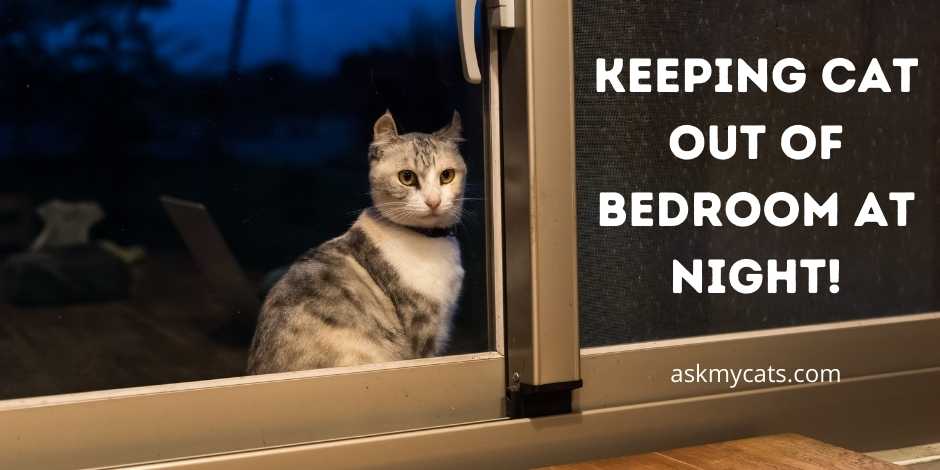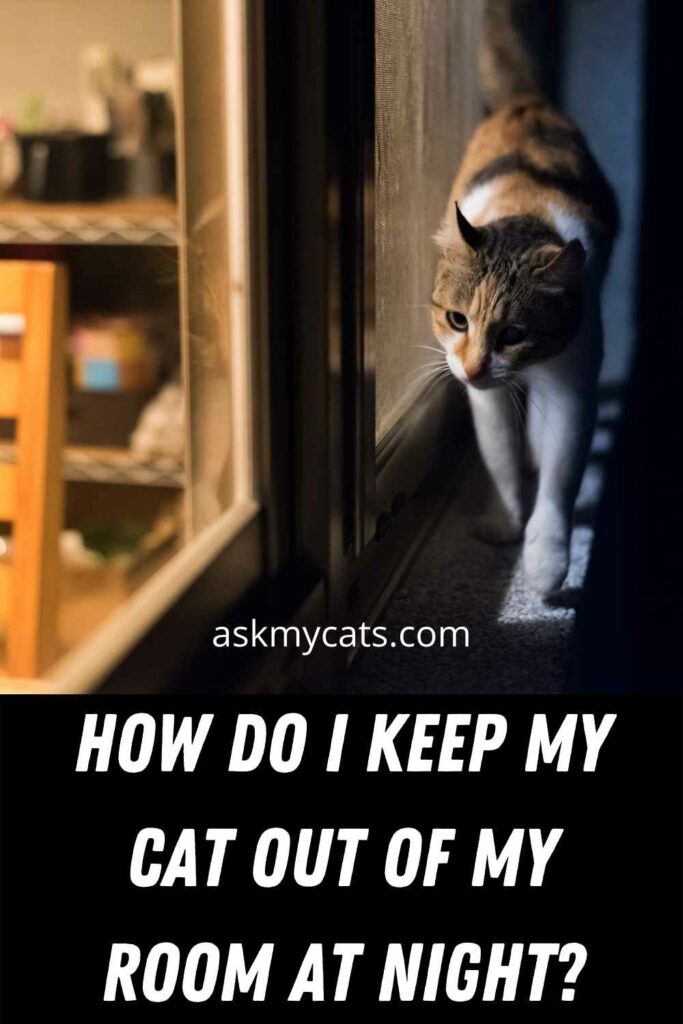Our adoring feline companions have a penchant for doing things we don’t want them to. They appear to do it on purpose at times!
This can also mean getting into locations where you’d like they didn’t. It might be a cellar filled with hazardous chemicals, a room filled with priceless artifacts, or even your bedroom at night.
You can keep your cat out of your bedroom by making an effort to enter and depart the room swiftly, closing the door instantly behind you before your cat can sneak into the room. If required, you might use treats and cat toys to divert your cat.
If you don’t have a door, you may either install one or consider putting up a barrier to prevent your cat from entering the room.


Give Your Cat the Perfect Day
Get the Free Ebook!
Is It Okay To Lock My Cat Out Of My Room At Night?
Closed doors irritate cats. They not only limit their mobility but also hinder them from seeing potential dangers. It is preferable to leave as many doors open as possible.
Note that a monitored house cat’s average wandering distance is 40-200 meters, thus even your entire house is considerably less than a normal cat’s turf. One of the reasons they want to extend it as far as possible is because of this.
Of course, some individuals don’t have a cat in their kitchen or bedroom, but this may need a different, less pleasant method of training. With minor changes, the approaches I detailed here will work for your case as well.
Adopted cats and kittens that are removed from their mother early are more likely to experience separation anxiety. The more devoted your cat is to you, the worse their separation anxiety will be.
As a result, you must address the underlying problem by making yourself more available to your cat.
It’s worth noting that cats arrange their days even better than we do. They like playing at the same time every day, eating at the same time every day, sleeping, cuddling, and even going to the potty at the same time every day.
She will compel you to play at 3 a.m. if her current playtime is 3 a.m. Even if you don’t engage, she’ll act out and make a commotion.
To break her pattern, play with your cat before bedtime to wear her out. After you’ve finished playing, give her some comforting scratches by softly touching her fur. Even if she visits your room now, it will be to sleep.
She’ll gradually adjust to your sleeping patterns. You can also opt to mess about her eating schedule. I observed that I need to feed my cat at 9.00 PM in order to go to bed at 00.00.
Around 10 p.m., he goes out to pee and returns around 11 p.m.-11.30 p.m. Other times didn’t work for me since my cat slept earlier than I did and would get up at about 3.30 a.m., disrupting my sleep.
Even if your schedule is unpredictable, the cat will follow it. Even if you open the door, she’ll most likely play herself as long as she knows you’re within reach. This decreases the likelihood of a paw in your mouth at 3 a.m.
You might like to read about where do cats sleep outside at night
Why Cat Cries When Locked Out Of Bedroom?
Many cats will become irritated because the door locks at night when they are alone. Otherwise, they are never alone and are not accustomed to being away from you!

As you can expect, this will have a psychological effect on the cat and cause it to be concerned.
It’s time to consider what’s going on mentally if a cat cries while shut out of the bedroom. Finding a means to erase patterns in the cat’s life that are linked with being away from you is the best approach to achieve this.
If your cat screams when you shut the doors to your rooms, it’s time to look into what’s causing it to be concerned.
Is the cat in its resting place safe? Is it the cat’s preference to sleep where it is meant to?
When a cat is in trouble at night and the bedroom door locks, these are the things a cat owner should be asking. Frequently, the cat will not like where it is sleeping and will want to accompany you into the bedroom.
Why not invest in a nice cat bad to ease the cat’s fears to avoid this problem?
Assuming your cat is accustomed to certain fragrances and feels comfortable in them, it’s preferable to employ such scents to calm your cat.
A cat that is drawn to you and seeks comfort in your company is an excellent illustration of this.
If that’s the case, it’s a good idea to rub a blanket over your skin to let the smell sink in. This will be used to keep the cat pleased even if you are trapped in your room.
The cat will be able to relax and feel protected against the blanket.
When it comes to younger cats, may seek solace in the fragrance of their mother.
This is why many cat owners maintain a scented blanket with the fragrance of their mother. Something like this will give the cat a chance to unwind and locate a “safe area” where it may rest without losing its smell.
If your cat screams when she is shut out of her room, this is one of the better options to consider.
It’ll be a quick fix that can frequently put an end to the cat’s worries in a matter of days.
You’ll need to devote some time to teaching your cat to be alone.
Many cats are accustomed to spending time during the day with other pets and/or people. This is natural, which is why they will weep if they are required to spend time alone at night.
They will resist, and it is at this point that you must take the time to calm them down. Training the cat to spend time alone in a confined environment is a smart choice (i.e. playpen).
Allowing your cat to spend time alone (in the house) while being trained will assist to eliminate this sort of behavior at night.
If your cat screams when she is shut out of her room, it may be time to invest in a tiny pet gate. This can be a nice method to keep the house open while still “enclosing” the cat in one area.
You’ll want to employ these subtle tactics to acclimate the cat to spending time alone.
Otherwise, you will have a pet that does not want to be separated from you and will wail at the door for hours at night!
Because no one likes to deal with it, it’s better to begin educating the cat to be self-sufficient right away.
When coping with the cat’s separation anxiety at night, it’s critical to maintain consistency. It won’t go away quickly, but the methods outlined below will make the process go more smoothly.
Also, check out why my cat waits outside my bedroom door?
Should I Let My Cat In My Room At Night?
You can let your cat in your room at night and can even sleep with him unless he does any mischievous act.

Remember that cats are nocturnal animals. While the average cat sleeps 15 to 16 hours per day, these rest periods do not occur at the same time or even at night.
While you’re attempting to go asleep, your cat may decide that now is the best time to run circles in your room or chase a ball around the house.
You could even have one of those unique kittens who pounce on your feet whenever you move your body or change positions. If any of these situations apply to your pet, you should explore a different sleeping arrangement.
While cats are known for their independence, some may be demanding and pushy. If you can sleep through their night-time antics, your bedtime will most likely be unaffected.
If, on the other hand, your furry companion is keeping you up at night, you may need to create some new ground rules.
Some cats are unconcerned about where they sleep. They might not even want to spend time with you in bed. On the other side, you could have a cuddly pet who enjoys being in close proximity to you.
We think having your kitten in bed with you is nice and soothing if it makes your pet happy and does not interfere with your bedtime.
Must Read: Why Are Kittens Sleeping In Separate Rooms?
How To Keep Cats Out Of Bedroom At Night?
Close the door to the room where you don’t want your cat to go. This is the most effective method for keeping a cat out of an area where you don’t want it. If the room lacks a door, add one as quickly as possible.

Be careful that while this creates a physical barrier to access, the cat may still attempt to enter since it is inquisitive about what is on the other side of the door.
You may enhance the cat’s stress by denying it entrance to a room it wants to enter. Inadvertently, this might move undesirable behavior to another section of the house.
Deny access only as a last resort, while obtaining guidance from a knowledgeable animal behaviorist or your veterinarian.
If the room doesn’t have a door, provide an alternate barrier. It may be difficult to construct a physical barrier that will keep all cats out, but attempt to develop one that is tailored to your cat’s agility.
While baby gates may not work for all cats, if your cat is just mildly interested in the room, or if your cat is old or infirm, a modest baby gate may discourage your cat from entering.
Keep your cat in a cattery outside. Allow the cat to wander inside just when you want him to, when you may close as many doors as you like. You won’t have to worry about the cat’s location when it’s safely enclosed in its own home this way.
However, this drastically restricts the cat’s area, perhaps causing stress. Stress can show itself in destructive behavior, incontinence of urine or feces, or even in the development of bladder issues in some cats.
If the cat is clawing at the door and you are in the room, ignore it. If you chastise a cat, he or she will repeat the behavior. If your cat’s “game” isn’t worthwhile, it won’t bother with it again.
Install a deterrent at the entrance. If it’s critical that the cat doesn’t scratch the door, place a canister of pressurized air alongside it with a motion detection trigger.
When the motion detector detects the cat, a burst of compressed air is released, which does not injure the cat but does cause him a scare. As a result, the cat will connect that door with a bad experience and will be afraid of approaching it.
You will also find it interesting to read about whether can i keep my cat in a cage overnight
How Do I Stop My Cat From Jumping On My Bed At Night?
If you don’t want to share your bed with your cat for any reason, get her a bed to call her own so she has a cozy place to sleep.
Choose a cat bed that you think she’ll like lazing on, like this adorable shark one. A heated cat bed is also a wonderful choice for those prepared to invest a little additional money.
Once you’ve found a cat bed she’ll appreciate, place it in a quiet spot where she can rest and fill it with a tiny blanket or an old t-shirt that smells like you.
It’s doubtful that she’ll automatically go to her bed, and it may take some time for her to acclimatize. If she attempts to crawl into bed with you again, take her up and carry her to her own bed. She should pick it up after a time.
If she doesn’t, try putting catnip on her bed or spraying a catnip spray on her bed to persuade her to spend time there.
Interesting Read: Should You Lock Your Cat In A Bathroom At Night?
Frequently Asked Questions
Is it mean to keep my cat out of my bedroom?
There are a variety of reasons why cats should not be allowed in rooms. Perhaps you have a newborn, a family member who suffers from allergies, or you are concerned about the cat damaging a valuable piece of furniture. Maybe you just want a cat-free zone in your home.
Should I ignore my cat meowing at night?
Finally, if your cat meows at night, you must entirely ignore it in order to avoid encouraging the behavior. Keeping the cat occupied at night may prevent it from becoming hungry or attempting to get your attention in novel ways.
Why do cats cry like a baby at night?
Cats interact with their owners and other cats through vocalizations. Crying is one technique to send a message to the recipient as well as anybody else nearby. Female cats scream at night for a variety of reasons, one of which is that they are seeking a partner.
Final Words
It’s critical to keep your attention on working with the cat and allowing it to acclimate over time.
If you keep persistent, the cat will understand that being alone isn’t as awful as it believes. It’s important to apply a full-fledged remedy as quickly as possible, whether that means purchasing a decent cat bed or utilizing a scented blanket.
Feel free to ask your questions in the comments section below!
Interesting Read: Why Won’t My Cat Stop Meowing In Her Cage?
